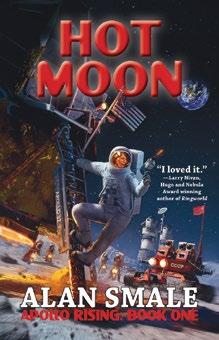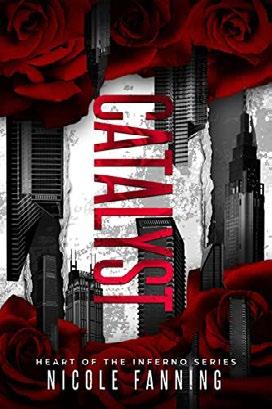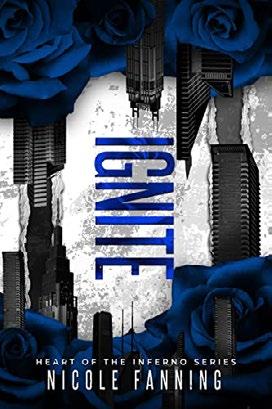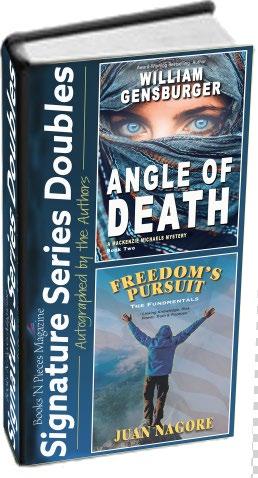
28 minute read
3 THE BOY AND THE WHALE
THE BOY AND THE WHALE
by David Bassano Starting a new job, a young man discovers all is not as it seems.
Advertisement
“It’s okay to carry metal into the building,” said Father. “Just make sure you leave every last bit in the locker room.”
“Okay,” said Trevor.
Mother finished packing their lunches into cylindrical metal canisters in the kitchen, her morning ritual for many years. She came out to the parlor and placed the canisters, one new and one old and dented, on the end table by the stairs. The news was playing on the screen, but the sound was turned down.
Mother stepped in front of her son and examined him minutely. He looked like a young, strong version of her husband, like when they’d met. She was trying not to cry.
“I’m so proud of you!” she said.
Standing just behind him, Trevor’s father smiled and suppressed his tears.
Trevor squirmed uncomfortably as his mother adjusted his shirt, pulling his collar straight. He didn’t want to stomp on her happiness, so he endured it. He thought, I wonder how old a woman needs to be before she dotes like this. The younger women didn’t seem to do it very much.
“Thanks, Ma.”
“Now, do your best,” she said. “Don’t let your family down.”
“I won’t, Ma.”
“He’ll be fine,” said Father, looking at his old watch.
The men took up the lunch canisters, slung them over their shoulders by the canvas straps, opened the front door, and fearlessly stepped into the mid-21st century.
“I’ll have a pot roast waiting for you when you get home!” Mother called out the front door.
“Thanks, Ma!” said two generations of men over their shoulders.
The men walked silently through the city streets, lunches a-swing at their sides. Their tiny neighborhood, only a few blocks deep, was an old-fashioned suburb, with front and back yards and garages alongside two-story homes. However, walk a kilometer in any direction, and the landscape changes drastically. To the west lay the gated communities of the chipheads, and to the east sprawled the choking downtown.
The two men continued three blocks to a bus stop, barely caught the next intra-city bus, and rode a few minutes to the subway, where the buildings and streets grew ragged like old clothes or untended gardens. The subway was packed, as it was every morning. Then they took the subway east to the industrial district on the river.
After a lurching ride, they ascended into the tepid light of downtown. The sidewalks were eroding and fringed with trash, the streets filled with rush hour traffic, with a haze of mild poison hanging over the cars. The men walked sin-
gle-file through the crowd. Everyone stared straight ahead or spoke quietly into the air in mobile conversations, many of them wearing gas masks if they could afford them. The buildings blocked the sunlight except at intersections. The concrete seemed to be slowly melting, falling in small pieces onto the sidewalks like ancient ruins decaying, softening the hard edges.
They saw a limousine go by at the intersection as a corporate helicopter beat the air overhead, streaking downtown.
Bastards, thought Trevor. Well, screw ‘em. They can’t touch me anymore. He pulled his posture straight and strode with more tremendous energy.
The chipheads called all the rest “cavemen,” those who didn’t have implants, who couldn’t afford them, those frozen at an earlier stage of evolution. The microchips implanted under the skull, hardwired to the frontal lobes, converted a person into a superbeing, claimed the advertisements. Thirty years hence, engineers cracked nature’s code by creating a seamless interface between the brain’s neurological communication and the microprocessor, permitting perfect brain-computer interaction. It allowed for recording and recall experiences, instant complex calculations, and sat-link access to databases, spreadsheets, and even the Internet. All the information is experienced as pure knowledge as if the user had always known these things. It produced workers able to mesh with mainframes, with each other, with the entire organization, at the speed of thought and with perfect accuracy. And those who could not afford the expensive procedure quickly learned that the world quietly, guiltlessly, discarded them. Of course, the corporations only wanted the most efficient worker in this highly-competitive world. Efficiency is the driver of progress; who would dare argue? HR departments wanted to know what RAM was under your skull and what OS your brain was running. There were court cases over employment discrimination, about what you could ask, but everyone knew it was obvious. What is twenty-two thousand, four hundred forty-seven point oh-two times four to the twenty-seventh power and onethird? Anyone who couldn’t answer immediately was out, Curriculum Vitae and their dreams deleted.
The line between the larger lower and shrinking middle classes was indelibly defined by technology. Without the money for the implant, one could never make the money needed to get the implant. The division between chipheads and cavemen was practically permanent. And to be a caveman in the mid-21st century was a difficult and monotonous sentence to bear. Nature was angry at man and reminded him daily. The summers grew unbearably hot, killing the weak and poor, and the storms fiercer, lashing the coasts like elemental demons. Crops failed, and forests were devoured by pests. Food and rent steadily grew more expensive, and the cavemen saw their employment options whither as machines or chipheads replaced them. You were either in or out, and it wasn’t good to be out.
Father and son went through the factory gates, and Trevor presented his security ID for the first time. A few chipheads came through in their suits, but most drove through a different gate in expensive cars.
None of them entered the double doors that Trevor and his father now used. Other people in street clothes joined them. They walked together through the gray halls, company notices and labor laws adorning the walls, to a crowded locker room. Trevor found his locker, his name label pristine on the metal door; he removed his crisp new uniform while dozens of other men did the same with much chatter. The uniform was cobalt blue, with gold stripes down the arms and legs, with Trevor’s name on the chest above the golden, sun-like corporate logo. The black work boots had plastic eyelets and a thick plastic toe cap, his belt a plastic buckle. He left everything else in the locker. █
ABOUT THE AUTHOR
David Bassano is a History professor at Brookdale Community College in New Jersey. He is also a human rights activist, an author of academic and literary works, and an avid hiker and cyclist. Trevelyan’s Wager, published by Harvard Square Editions, is his first novel.
You may learn more about him and his work at: https://www. facebook.com/davidbassanoauthor/ We received over 150 entries, and our judges selected these three winners. Books & Pieces Magazine congratulates them. Their stories will be published in the July issue.
FIRST PLACE WINNER:
DANIEL JACKSON Story title: ‘Awakening’ Daniel Jackson is an aspiring writer from Newport, Rhode Island, striving to create new and exciting works of fiction. He graduated with a degree in mechanical engineering and works as an environmental scientist in the Pacific Northwest. He can be found exploring the pacific coast or wandering through the mountains, finding inspiration for his work through his adventures. He lives in Portland, Oregon with his soon-to-be wife.
SECOND PLACE WINNER:
KATHERINE SORIANO Story title: ‘A Return to Romance’ Katherine Soriano was born and raised in the San Francisco bay Area. She got her B.S. In mathematics and Economics from Uc San Diego. A homebody through and through, she would rather spend her time searching the web for fanfiction. Sometimes, she will leave the comfort of her home to hang out with her extensive Filipino family. Writing will always be her first love. She now lives with her boyfriend, dog, and cat in the 925 area. You can follow her on Instagram @ howveryoriginal
THIRD PLACE WINNER: MAGGIE NERZ IRIBARNE
Story title: ‘My Father the Principal’ Maggie Nerz Iribarne is 52, living her writing dream in a yellow house in Syracuse, New York. She writes about teenagers, witches, the very old, bats, cats, priests/nuns, cleaning ladies, runaways, struggling teachers, and neighborhood ghosts, among many other things. She keeps a portfolio of her published work at https://www.maggienerziribarne.com.
OUT OF HIS LEAGUE
by Gerry Coleman What happens when Billy Olsen falls for a girl ‘out of his league’?
“Love is a zero-sum game. Pretty much.” – Billy Olsen
Billy behaved oddly when he saw her, like a Cubist painting tumbling down a staircase.
It was Tuesday evening. The Parrot Lounge’s sole décor statement was a stuffed parrot in a cage hanging from the ceiling below a light bulb in blueish cigarette smoke. It was not the place to take a date nor find a snug corner to brood in—too much light, too loud, substandard bar food, and flat pitchers of beer.
The Parrot stuck to the working class, backstreet tradition for sideways mobile singles, and the struggling college crowd. People hung out with friends, and some pushed tables together. Sixties folksy pop music was on the jukebox: Simon and Garfunkel, Dylan, Jefferson Airplane, The Doors. It was a hangout to waste a few hours and punch in another day toward the weekend. Weekday nights were about nothing—talking, listening to music, leaving early, getting up for school, or a boring office job.
The neighborhood was not the best. On the haggard verges of the city, the commute into Manhattan was an hour, and the city skyline was beyond view even on clear nights. You couldn’t see the Statue of Liberty if you knew where it was. The district was losing a bout of gentrification to pseudo-sophisticated eateries and bullshit woody pubs with cheap gas fireplaces named after romantic, mystical things: The Salmon of Truth, The Silver Apples of The Moon, and Where The Water Lilies Grow.
The beer-and-ball gin mills known by family names and the old ethnic associations were being sold off by grandchildren and banks in receivership to real estate companies. Phony Northern Italian affairs were likewise replacing longstanding, family-run Italiano restaurants with valet parking, frozen butter patties in cardboard squares, and tiny porcelain spoons for The Parmigiana in while cups with lids. The Villa Bellini had a dwarf dressed as a gentleman on a gin bottle at the door.
Billy Olsen looked at her through a three-ringed pretzel as she sat with her girlfriends. He had been looking at her for weeks. She was pretty and on the quiet side. She fiddled with the fringes at the end of a red bandito-looking serape that she wore. Her chestnut brown eyes highlighted by coral shadows of teal and cobalt blue under black penciled eyebrows. She was perfect. Maybe a little too perfect.
He considered the salt crystals on the pretzel. Janis Joplin complained about something in the background—Awah, Awah, Awah— while his friends discussed how the Mets sucked. Each salt crystal was a tiny, white marbled geometric fragment

that glowed dully from inside when angled in the artificial light. He wondered how it worked, getting the salt on the pretzel distributed evenly across the circumference of the rings. It was as though little workers attached each crystal separately—intertwined, salted infinity loops tied in a bow.
Billy went incognito against a side window to cover a better view of the girl. He placed his glass on the sill and turned red next to the Rheingold Extra Dry sign. After staring at her long enough to get caught, he went to the bar for another pitcher. His friends, Eddie and Richie, presented their glasses like nestlings when he returned.
Eddie was on about how the Mets sucked. Billy Olsen conceded the Mets were not good, but as much ironically as literally. Janis absorbed his bluesy mood whenever he played her on the jukebox, so he fed it coins to match the girl.
She and her friends came every Tuesday night and always sat in the same chairs at the same table. Always she listened patiently, attendant to her girlfriends—her smile fixed during humorous stories or frowning thoughtfully throughout if sad. Her comments were introduced by disclaimers and facial modifiers she tilted into when she spoke.
“I don’t know, perhaps . . . I guess, I think . . .”
She felt out of place. Billy found that sweet. Perhaps she was out of place. Sometimes she would rustle for a moment, then reconnect with her friends. She had an extra pair of incisors on the top row that picked up smudges of bright red or pink lipstick. But the quality that leaped out, that was beyond interpretation— she was in a fashion universe of her own.
The Parrot was filled with people in jeans, t-shirts, or sweaters, while she tried out an imitation Tang Dynasty Retro with flowing dragon sleeves for the first cool Tuesday night of autumn.
One week she wore a roaring twenties flapper dress with a long stole across and down her shoulders and arms, and a rakish tilted Gatsby hat on top. The next time, she arrived in a bright, curtain-like Indian sari. Diaphanous like see-through clouds.
She was out of his league.

It was important to be in his league. Girls a too tall or too short, or too this or that, were in his plans because he was a little too himself. Shoot too high, and he was looking for trouble down the road. Go low; he already lost. Since his teenage years, he was more comfortable when he, and his dates, were more comfortable—in the same league.
He had dates with girls with acne, for example, who applied foundation make-up that would not necessarily match their natural facial coloration or texture. By the time they were back at the girl’s door at the end of the evening, her face would have cracks like desert sands. But suppose, just before he kissed her, the girl nudged forward a little teddy bear tongue from between her lips, ever so slightly. What pimples? Suppose she lifted her shoulder tips and tilted her face to await Billy’s first embrace. He would be glad to accommodate the inconvenience of the blemishes and the flaking make-up if the girl was that nice.
Being in his league was a
series of compromises and offsetting compensations, but he was hardly perfect. The girls on the receiving end performed the same asset-to-liabilities assessments. His hair was thinning at age twenty-one. He frequently suffered cognitive fogginess when anxious and was prone to childishly impish mood swings.
One Tuesday night in steady snow in deepest winter, while Richie explained how his Army Reserve meeting went, Billy Olsen took a flat beer to his spot by the bar’s only window. The sill was a death destination for leafy, formerly flying insect carcasses to pile up for The Parrot’s weekly sweepup. He made a porthole with the heel of his palm in the condensation and squinted through the aperture into the unnatural neon redness. He looked through a life-sized reflection of his eye, which appeared in the storm outside the window, and imagined pigeons puffed along the cliff ledges of the apartments above the avenue. Snow curled around and into the hidden crevices and rims. The headlights of a black sedan doing eight miles-per-hour down the middle of the road made the snow whiter, fall thicker, and more severely angled in front of it. Its ice-thickened windshield wipers thumped to the ghost-wagon jangle of snow chains long after the car disappeared into the storm.
Billy checked the girl out through a pretzel ring to see what she was wearing when she appeared in the middle of a loop.
He made “Hi” with his lips. She made “Hi” back. He smiled. She looked away. When he least expected it, he was in front of her. She was alone at her table. Perhaps that was why he got up.
“Hi. Sorry for snooping on you through the pretzel. Your outfit is very nice. What is it, a poncho?”
“I guess it’s a poncho. Or a wrap, perhaps.”
“Sorry.” He offered her his hand. “I’m Billy Olsen.”
Her left hand offered up from under her wrap.
“Hello Billy Olsen. I am Gabriella.”
They talked about ponchos and wraps and sun colors, things Billy knew nothing about. When her girlfriends came back, he returned to his table. Before leaving for the night, he looked for her through a pretzel to say “Bye,” but she was already gone.
The following Tuesday, taking the great circle route to the bar with apparent nonchalance around her table, he said, “Hey, Gabriella. Nice cape, I think?”
“A cape. Maybe a blanket.”
“I believe it’s a cape.”
“Could be.”
It was a blanket, Lakota Sioux in design. A star quilt with bright reds, yellows, and oranges clipped with a clasp to hold it together, crafted with her head in the middle.
Taking Billy’s lead, the guys, without being asked, carried their chairs to encamp at the girls’ table in a coordinated, peaceful occupation. They mostly had girlfriends, but it was not that kind of move. The Parrot was not that kind of place. The Parrot wasn’t particularly any kind of place. A random conversation sparked around the table. People knew other people who knew someone else. This and that. Billy kept an eye on Gabriella, even though she was out of his league, even though he didn’t expect a promotion any time soon.
Richie lit a joint. Teddy and Sal were behind the bar. They were cool. Richie was cool. He took a toke and backhanded it waist high under the table to the girl to his left. The joint passed cupped by the giver to the receiver to preserve the spark around the table. It was accepted to gift to the next. Some declined, no offense, passing it on by the wettened tip. Others made it glow red in the grottoes of their palms. Peace be with you. When it came to Billy, he took a draw, hoping not to fall into a coughing fit, which he did. Gabriella’s left hand came from under her Lakota blanket to rescue it into a lingering pull, passing her bright red lips and extra teeth into her lungs, which she held.
Richie drove some of them home in his father’s 1960 Lark. Billy Olsen and Gabriella piled into the backseat with a girlfriend in between. He tried to make eye contact, but Gabriella was happy to be the center of his attention from a safe distance. John Lennon and The Plastic Ono Band joined them, jacked loud by Richie, who swayed with the wheel, and they all sang and swayed like the moon, the sun, and the stars along Third Avenue onto Ninety-Seventh Street and along Marine Boulevard.
Brownstones and row houses with stone stairs like miniature inner-city Aztec temples stood shoulder to shoulder on side streets so as to share laughter, nightmares, radio shows, and screams of love and anger. Constructed of sandstone extruded from condensed rock 250 million years old, the houses themselves had been built in the late 19th and early 20th centuries. On top of the stoops were concrete lion planters with one geranium apiece that smelled like cat pee, depending on the season, with a family living in the basement with a wormeye view of the trash cans.
Billy Olsen tried to close in on Gabriella around the immensity of her girlfriend’s overcoat; she continued to sway on and on, on and on with John and Yoko. He worked himself close enough to bombard Gabriella with battalions of photons shooting from his eyes, which he was unaware did not work that way, but so it felt to him, and so it felt to her.
His eyes were a deep, bland gray, like the Brooklyn night sky in the clouds above the streetlights. The Verrazano Bridge’s red warning lights blinked against the sea fog leading cars and trucks over the black waters of The Narrows out of the city into the rest of America and vice versa.
The girl’s coat parted enough to allow him to touch Gabriella’s shoulder with his forearm. Billy Olsen was closer to her girlfriend’s head than to Gabriella when he said, “Tell me a story about you.”
He had waited way too long to ask her something meaningful.
“Please. You could make it up, and I promise to believe you.”
“I don’t have a story. At least I can’t think of one.”
It was like her to say that.
“I can’t think of a story about me either.” This was a lie.
So, he told her how he went to Newark to visit Stephen Crane’s grave. His arm was now on the back of the seat over her shoulder. He told her how the rain whipped into his face, how he knew Crane’s
poems. They were short, and there weren’t many, and he recited a few standing over what was left of Crane underground.
One poem he repeated to her was about a man who ate his heart because it was his heart.
And another about a man ready to leap to his death in the arms of his love:
“. . . If thou and thy white arms were there, / And the fall to doom a long way.”
Billy Olsen didn’t realize how 19th-century proper and corny this sounded to her. He meant for it to refer to her.
“Just me and Crane,” he said. “The rain turned to snow crusting my head and shoulders and Crane’s grave white.”
Also, a lie.
Her drawn eyeliner, black and perfectly curved, pushed into her forehead as she sat silently. Her eyelashes fluttered in the car window as she watched Brooklyn fly by—lashes designed to slice a young man’s heart.
They drove between four cauldrons of sewer gas at the intersection near where the girls lived. Richie pulled up in front of their apartment building and turned to the backseat; his arm incidentally dropped over the girl next to him.
“Here we are. Out you go.”
Out they were. Billy had a long hike home in the storm. He had a brief chat with Gabriella, while her girlfriend fled in her overcoat into their building.
“Maybe see you next week?” he asked.
Her hair was parted perfectly down the middle and combed to slide alternatively from one side of her face to reveal the other if she tilted, which she did. Billy got the impression she wanted him to come upstairs. He followed her in. They no longer thought about what either meant when they were alone in the elevator.
The apartment door was ajar when they got to her floor. California Dreaming drifted from her girlfriend’s room.
They sat on the sofa. Gabriela unfastened the clasp of her Lakota blanket to reveal an embroidered, carnelian-red percale blouse.
Her right arm was willowy and handless, like the bud of an un-blossomed flower. Gabriella touched Billy’s cheek. She had beautiful eyes.█
ABOUT THE AUTHOR
Gerry Coleman was born and raised in Brooklyn, New York. He graduated from Saint Peter’s College in 1966 and did his graduate work at Wagner College and Columbia University through the mid-1970s. He taught writing and literature at Union County College in New Jersey for almost forty years.
Since retiring to Dunedin, Florida, he helps organize and run writing workshops for WordSmitten Media in St. Petersburg, Fla., works with the Chair of The Authors Guild [Florida Chapter] put together meetings and events, and consults with writers on their full-length book projects.
He is currently working on a collection of short fiction set in Vietnam era Brooklyn.

Honor the Memory of Your Beloved Pet For A Lifetime.
Only $7.77 (no hidden costs) Books ‘N Pieces Magazine — JUNE 2022 — www.BooksNPieces.com 19
click for more
ACT TWO: INTERVIEWS
Nicole Fanning ~The Power of Cellphone Writing~
Nicole Fanning is an author, copywriter, wife and super proud dog mom to three rambunctious rescue dogs.
She considers herself an old school romantic, with a proclivity for a little mischief.
With a background in marketing, and Human Resources, she’s found that the human element is by far the most colorful, complex and most interesting in the world.
As I child, she says she devoured every book she could find, and spent her free time writing fictional short-stories to share with friends.
Was that the reason she decided to write her first novel?
Q: You’ve got two novels out, ‘Catalyst,’ and ‘Ignite,” with a third ‘Flash Point’ coming out this year. Your ‘Heart of the Inferno’ Series.’ And you’ve said there would be 14 novels in the series. How do you know this far ahead of time, or have you plotted out all of them already?

Before I allowed myself to write a single sentence of Catalyst, I mapped out the entire plot for all fourteen books in what I call my “Plot Skeleton.” These fourteen books will make up our Mafiaverse, and they will cover the four main books in the Heart of the Inferno Series, as well as prequels, sequels, and a handful of smaller novellas!
Q: You describe yourself as obsessed with Mafia-like scenarios and Sir
Arthur Conan Doyle. And your current series seems to be along the lines of a Mafia romance? Is this correct, and what draws you to that genre?
I would call it a Mafia Thriller-Romance as my goal was to make it both a thriller and a romance. While the two main characters are drawn together out of love, I cover their spine-tingling romance, and they are caught in a much bigger “game afoot” with shadowy figures determined to seize power...whatever the cost.




THE MIDDLING AFFLICTION Conradverse Chronicles, Book One Alex Shvartsman Trade Paperback ISBN 978-1-64710-054-4. May 31, 2022. $16.99
GUARD BROOKLYN, FIGHT MONSTERS, TAUNT BAD GUYS
“With the fast-paced first Conradverse urban fantasy, Shvartsman (Eridani’s Crown) delivers a laugh-out-loud, snarky adventure, throwing out pop culture references and wry observations with dizzying frequency.... His supernatural New York City is vibrant and authentic, and Conrad fits right in with wisecracking fan favorite heroes like Harry Dresden and Simon Canderous. The result is a thoroughly satisfying romp.”—Publishers Weekly “A fine mixture of magic and mayhem.”—Simon R. Green, New York
Times bestselling author
THE REINVENTED HEART Tales of Futuristic Relationships Cat Rambo & Jennifer Brozek (editors) Hardcover ISBN 978-1-64710-042-1. May 31, 2022. $27.99
Featuring Jane Yolen, Lisa Morton, Premee Mohamed, Seanan McGuire, Mercedes M. Yardley, Naomi Kritzer & many more.
They say love conquers all, but what happens when technology advances too much? Can it conquer space and time and even gender ambiguity?
The Reinvented Heart presents stories that complicate sex and gender by painting vivid pictures of how evolving technologies affect our relationships, social attitudes and practices. The book turns traditional tropes inside out and molds them into brilliant stories set in the near to far future.
“Come here for the good stuff.”—SFWA Grand Master and New York
Times bestselling author, Mercedes Lackey
HOT MOON Apollo Rising, Book One Alan Smale Hardcover ISBN 978-1-64710-050-6. July 26, 2022. $29.99
1979. Vivian Carter is leading the Apollo 32 mission to the Columbia Space Station, orbiting the Moon, when the station comes under attack by the Soviets, and she is ordered to land at Hadley Base on the lunar surface.
But soon Hadley itself is under attack and Vivian must muster all her resources to help fend off the assault. Why are the Soviets suddenly breaking a peaceful co-existence and jeopardizing everything both nations have worked for?
“A nail-biting thriller set in a plausible alternate 1979…coupling suspenseful plot developments with fully realized characters.” —Publishers Weekly CAEZIK SF & FANTASY
“I loved it. Great ‘hard’ science fiction with convincing space battles.” —Larry Niven, Hugo & Nebula Award winning author of Ringworld
Ingram Publisher Services
Books ‘N Pieces Magazine — JUNE 2022 — www.BooksNPieces.com 21

Q: Do you write using your cell phone? Why a cell phone versus a tablet or other instrument, and do you dictate or type into the phone? Could you tell us some more about your process for writing?
I constantly write wherever I am. So, whether I’m sitting at the dentist’s, on a plane, or riding as a passenger on a long car ride, writing on my phone allows me the flexibility to write wherever I am. I generally put together the plot skeleton for the individual chapter I’m working on, as well as any specific dialogue I want the characters to have.
Later, I transfer the rough draft to my computer in my home office when I get home. There, I can flush out the ideas I jotted down, work on the dialogue, and really create the fluidity with the surrounding chapters.

Q: Your background was in marketing and Human Resources. When did you decide to leave that career, and what promoted the move?
I believe the human element is by far the most interesting. I believe each of us has been blessed with a gift or a passion and that the world will continue to be a beautiful place if we put those gifts and passions to good use through the art we create.
I had already been writing casually before the Pandemic forced us all into our houses, and once it became apparent that it would be the norm for a while, my writing became my lifeline and escape from the anxiety of the unknown. Once I had a good chunk of chapters done, I sent the rough draft of the first book to a friend of mine, just for fun. I was shocked when she told me she couldn’t put it down, and that’s when I decided to leap full time into writing, and I have never been happier!
Q: What’s the worst part of the writing process for you, and how do you overcome it?
Setting a writing habit. I learned early on that writers in motion stay in motion, and writers at rest, stay at rest. I needed the structure of having a dedicated portion of every day set aside expressly for writing, or I would get too far behind on schedule. Writing up the general chapter notes on my phone allows me to
NOTE: ALL BOOK COVERS ARE HYPERLINKED. CLICK THEM!
keep to that commitment no matter where I am.
Q: What has been the best moment for you in this journey?
The fans. I know every writer thinks they have the best fans, and none of us are wrong. But my HOTI fans are downright incredible. The Heart of the Inferno Discord was born out of fans’ minds, and from there, a beautiful and supportive community has blossomed. Their encouragement has pushed me forward and made HOTI into what it is today, and I will never be able to thank them enough.
Q: Anything else that you wish to share with our readers?
Only that Jaxon Pace is ready to be your next “Book Boyfriend!”
Find Nicole Fanning at:
Amazon: https://amzn.to/3wJgJOM Facebook: https://www.facebook.com/nicole.fanning.1 Website: nherownwords.com Authors: Would you like to INCREASE your sales? Introducing the Books&Pieces Magazine SIGNATURE SERIES DOUBLES!
If you find that your sales are just not as good as you wish, this is a NEW option you can try at no risk and no cost to you. In the 1950s, publishers printed ACE DOUBLES, two novels back to back with two different authors. It increased sales and exposure to lesser known authors.

The Power of TWO Authors in One e-Bookvery appealing to readers
Want to discuss it further? Email William (at) BooksNPieces. com and start the conversation. No obligation. Then decide if this is right for your book. • COSTS YOU NOTHING • YOUR EXISTING TITLE REMAINS AS IS, WITH YOU • WE DO THE REST
HERE’S HOW IT WORKS: Books ‘N Pieces Magazine
adjusts your manuscript for a new layout and cover (see image). We add your autograph to the new first page, get a new ISBN for the Signature Series, and publish the new e-book under the Books ’N Pieces banner. The other author will compliment you with the same genre. Once completed and compiled as multiple e-book formats (mobi, ePub, PDF) we market it. There is no cost to you in any of this, and this new book merely adds to your Online presence, exposing you to new readers. You still earn royalties from your existing title, under your control —we do not ever have access to your existing account. ROYALTIES: We pay each author 30% of the net royalty from each sale each month. (Net = gross royalty x 30%) CONTRACT: Author retains ALL rights. We contract with you for a period of 1 year because it would be difficult to end one author but not the other. At the end of the year you may renew if you (and the other author) wish. It’s that simple.
Branded with Books ‘N Pieces Magazine you enjoy the benefits of our marketing & advertising, including in our own world class magazine featuring many bestselling authors. It’s the
POWER OF TWO AUTHORS and
Books ‘N Pieces Magazine! We call that a WIN!









